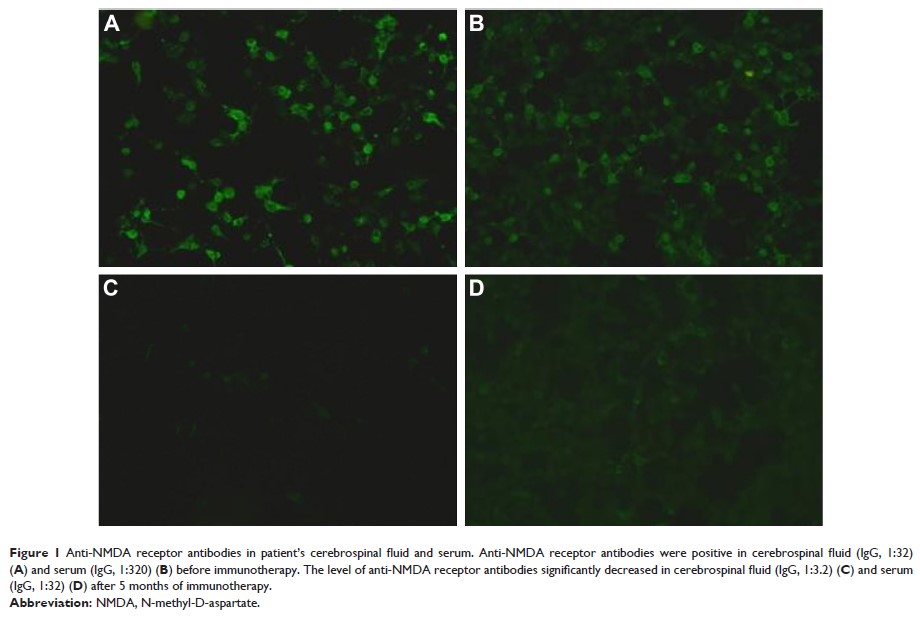9 7 8 1 6
论文已发表
注册即可获取德孚的最新动态
IF 收录期刊
- 3.3 Breast Cancer (Dove Med Press)
- 3.4 Clin Epidemiol
- 2.5 Cancer Manag Res
- 2.9 Infect Drug Resist
- 3.5 Clin Interv Aging
- 4.7 Drug Des Dev Ther
- 2.7 Int J Chronic Obstr
- 6.6 Int J Nanomed
- 2.5 Int J Women's Health
- 2.5 Neuropsych Dis Treat
- 2.7 OncoTargets Ther
- 2.0 Patient Prefer Adher
- 2.3 Ther Clin Risk Manag
- 2.5 J Pain Res
- 2.8 Diabet Metab Synd Ob
- 2.8 Psychol Res Behav Ma
- 3.0 Nat Sci Sleep
- 1.8 Pharmgenomics Pers Med
- 2.7 Risk Manag Healthc Policy
- 4.2 J Inflamm Res
- 2.1 Int J Gen Med
- 4.2 J Hepatocell Carcinoma
- 3.7 J Asthma Allergy
- 1.9 Clin Cosmet Investig Dermatol
- 2.7 J Multidiscip Healthc

抗 N-甲基-D-天冬氨酸受体脑炎疑似抗抗精神病药致恶性综合征:病例报告和文献回顾
Authors Wang HY, Li T, Li XL, Zhang XX, Yan ZR, Xu Y
Received 23 November 2018
Accepted for publication 19 February 2019
Published 2 April 2019 Volume 2019:15 Pages 773—778
DOI https://doi.org/10.2147/NDT.S195706
Checked for plagiarism Yes
Review by Single-blind
Peer reviewers approved by Dr Amy Norman
Peer reviewer comments 3
Editor who approved publication: Dr Yu-Ping Ning
Background: Anti-N-methyl-D-aspartate
(anti-NMDA) receptor encephalitis is a severe autoimmune disease characterized
by complicated psychiatric and neurological symptoms and a difficult diagnosis.
This disorder is commonly misdiagnosed, and diagnosis is often delayed. The
clinical signs can mimic other psychiatric abnormalities, such as neuroleptic
malignant syndrome (NMS) that is usually caused by antipsychotic exposure. This
fact raises the question of whether the symptoms common to NMS are due to
anti-NMDA receptor encephalitis or established NMS.
Cases presentation: We
describe a rare case of a 29-year-old male without psychiatric history who
initially presented with a fever, altered consciousness, behavioral changes,
rigidity, and elevated creatine kinase. He was initially diagnosed with NMS.
NMS-like symptoms did not improve with active treatments and disappeared for a
long period after discontinuing antipsychotics. The patient gradually developed
a complicated disease progression, including speech impairment, mutism, and
movement disorders, and symptom progression led to the final diagnosis of
anti-NMDA receptor encephalitis. The related pathophysiological mechanisms,
clinical features, and treatment of this disease are reviewed.
Conclusion: We
highlight that the natural progress of anti-NMDA receptor encephalitis can
mimic the symptoms of NMS and NMS-like features could be due to anti-NMDA
receptor encephalitis upon antipsychotic exposure, and not true NMS.
Clinically, the suspicion of NMS may serve as a significant alarm to suspect
anti-NMDA receptor encephalitis and lead neurologists or psychiatrists to
investigate such a diagnosis.
Keywords: acute
psychosis, anti-NMDA receptor encephalitis, autoimmune encephalitis,
neuroleptic malignant syndrome, antipsychotics, diagnosis
